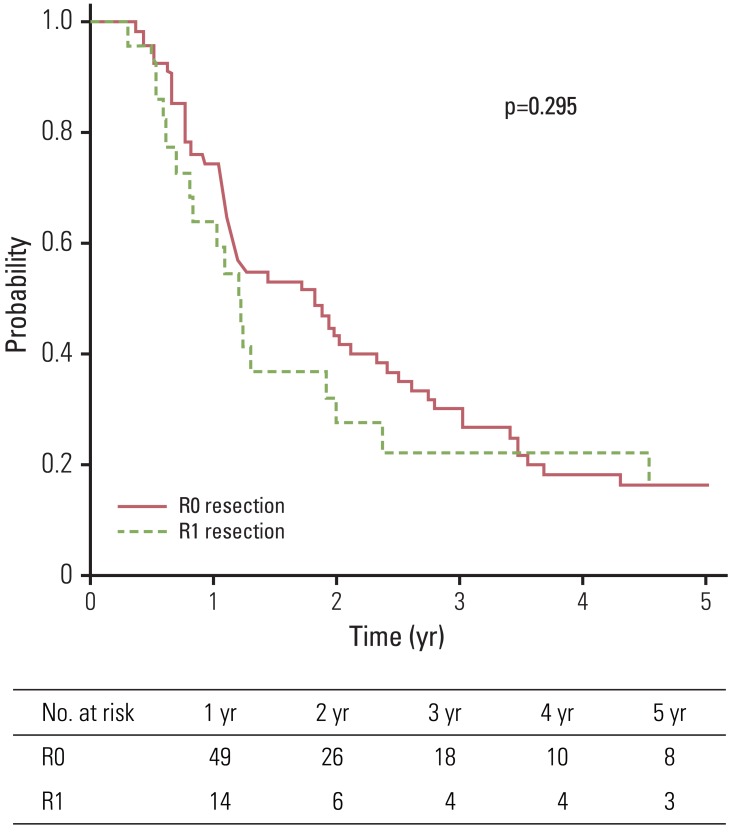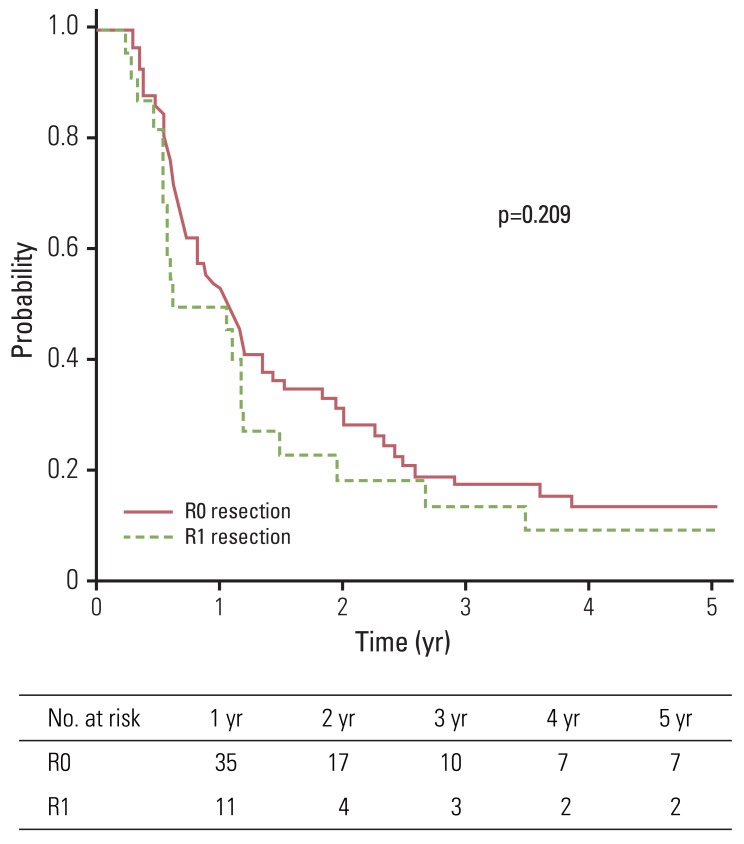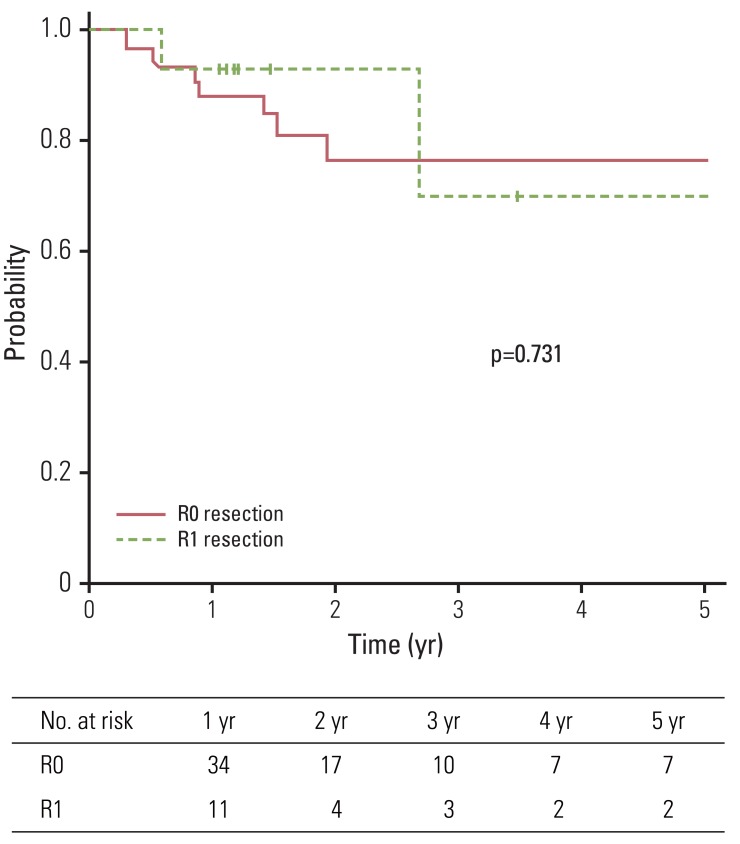Cancer Res Treat.
2013 Sep;45(3):202-209.
Role of Postoperative Radiotherapy for Microscopic Margin Involvement in the Squamous Cell Carcinoma of Esophagus
- Affiliations
-
- 1Department of Radiation Oncology, Seoul National University College of Medicine, Seoul, Korea. ekchie93@snu.ac.kr
- 2Institute of Radiation Medicine, Medical Research Center, Seoul National University, Seoul, Korea.
- 3Department of Thoracic and Cardiovascular Surgery, Seoul National University College of Medicine, Seoul, Korea.
Abstract
- PURPOSE
The objective of this study was to assess the effect of postoperative radiotherapy on the outcome of esophageal cancer with microscopically positive resection margin by comparing the results with those of patients with negative resection margin.
MATERIALS AND METHODS
Medical records of 88 patients treated with macroscopic resection followed by postoperative radiotherapy for stage II or III squamous cell carcinoma of the esophagus from June 1984 to March 2008 were reviewed. Twelve patients had received chemotherapy. Patients were classified into two groups based on resection margin status: negative resection margin (group A, n=66) and microscopically positive resection margin (group B, n=22). Median follow-up duration of living patients was 68 months (range, 18 to 115 months). Median total radiation dose of group A and group B was 51.5 Gy (range, 45 to 69 Gy) and 52.1 Gy (range, 45 to 64 Gy), respectively.
RESULTS
Median overall survival and disease-free survival were 15 and 10 months, respectively. The five-year overall survival, disease-free survival, and local control rates for group A and group B were 15.9% and 16.4%, 13.5% and 9.1%, and 76.3% and 69.6%, respectively. No statistically significant difference in terms of overall survival, disease-free survival, and local control (p=0.295, p=0.209, and p=0.731, respectively) was observed between group A and group B. Seven patients experienced toxicity of grade 3 or higher.
CONCLUSION
A significant portion of patients with margin involvement reached long term survival after addition of postoperative radiotherapy. These results suggest a potential role of postoperative radiotherapy, especially for patients with margin involvement.
Keyword
MeSH Terms
Figure
Reference
-
1. Jemal A, Clegg LX, Ward E, Ries LA, Wu X, Jamison PM, et al. Annual report to the nation on the status of cancer, 1975-2001, with a special feature regarding survival. Cancer. 2004; 101:3–27. PMID: 15221985.
Article2. Medical Research Council Oesophageal Cancer Working Group. Surgical resection with or without preoperative chemotherapy in oesophageal cancer: a randomised controlled trial. Lancet. 2002; 359:1727–1733. PMID: 12049861.3. Burmeister BH, Smithers BM, Gebski V, Fitzgerald L, Simes RJ, Devitt P, et al. Surgery alone versus chemoradiotherapy followed by surgery for resectable cancer of the oesophagus: a randomised controlled phase III trial. Lancet Oncol. 2005; 6:659–668. PMID: 16129366.
Article4. Kelsen DP, Winter KA, Gunderson LL, Mortimer J, Estes NC, Haller DG, et al. Long-term results of RTOG trial 8911 (USA Intergroup 113): a random assignment trial comparison of chemotherapy followed by surgery compared with surgery alone for esophageal cancer. J Clin Oncol. 2007; 25:3719–3725. PMID: 17704421.
Article5. Mulligan ED, Dunne B, Griffin M, Keeling N, Reynolds JV. Margin involvement and outcome in oesophageal carcinoma: a 10-year experience in a specialist unit. Eur J Surg Oncol. 2004; 30:313–317. PMID: 15028315.
Article6. Rice TW, Adelstein DJ, Chidel MA, Rybicki LA, DeCamp MM, Murthy SC, et al. Benefit of postoperative adjuvant chemoradiotherapy in locoregionally advanced esophageal carcinoma. J Thorac Cardiovasc Surg. 2003; 126:1590–1596. PMID: 14666038.
Article7. Zafirellis K, Dolan K, Fountoulakis A, Dexter SP, Martin IG, Sue-Ling HM. Multivariate analysis of clinical, operative and pathologic features of esophageal cancer: who needs adjuvant therapy? Dis Esophagus. 2002; 15:155–159. PMID: 12220424.
Article8. Hughes BG, Yip D, Chao M, Gibbs P, Carroll S, Goldstein D, et al. Audit of postoperative chemoradiotherapy as adjuvant therapy for resected gastroesophageal adenocarcinoma: an Australian multicentre experience. ANZ J Surg. 2004; 74:951–956. PMID: 15550081.
Article9. Teniere P, Hay JM, Fingerhut A, Fagniez PL. Postoperative radiation therapy does not increase survival after curative resection for squamous cell carcinoma of the middle and lower esophagus as shown by a multicenter controlled trial. French University Association for Surgical Research. Surg Gynecol Obstet. 1991; 173:123–130. PMID: 1925862.10. Zieren HU, Muller JM, Jacobi CA, Pichlmaier H, Muller RP, Staar S. Adjuvant postoperative radiation therapy after curative resection of squamous cell carcinoma of the thoracic esophagus: a prospective randomized study. World J Surg. 1995; 19:444–449. PMID: 7639004.
Article11. Fok M, Sham JS, Choy D, Cheng SW, Wong J. Postoperative radiotherapy for carcinoma of the esophagus: a prospective, randomized controlled study. Surgery. 1993; 113:138–147. PMID: 8430362.12. Edge SB, Byrd DR, Compton CC, Fritz AG, Greene FL, Trotti A. AJCC cancer staging manual. 7th ed. New York: Springer;2010.13. Suntharalingam M, Moughan J, Coia LR, Krasna MJ, Kachnic L, Haller DG, et al. The national practice for patients receiving radiation therapy for carcinoma of the esophagus: results of the 1996-1999 Patterns of Care Study. Int J Radiat Oncol Biol Phys. 2003; 56:981–987. PMID: 12829133.
Article14. van Hagen P, Hulshof MC, van Lanschot JJ, Steyerberg EW, van Berge Henegouwen MI, Wijnhoven BP, et al. Preoperative chemoradiotherapy for esophageal or junctional cancer. N Engl J Med. 2012; 366:2074–2084. PMID: 22646630.
Article15. Boone J, Livestro DP, Elias SG, Borel Rinkes IH, van Hillegersberg R. International survey on esophageal cancer: part II staging and neoadjuvant therapy. Dis Esophagus. 2009; 22:203–210. PMID: 19191855.
Article16. Jabbour SK, Thomas CR Jr. Radiation therapy in the postoperative management of esophageal cancer. J Gastrointest Oncol. 2010; 1:102–111. PMID: 22811814.17. National Comprehensive Cancer Network. NCCN clinicalpractice guidelines in oncology. v.1.2010 esophageal cancer. Fort Washington: National Comprehensive Cancer Network;2009.18. Kato H, Tachimori Y, Watanabe H, Yamaguchi H, Ishikawa T, Nakanishi Y, et al. Anastomotic recurrence of oesophageal squamous cell carcinoma after transthoracic oesophagectomy. Eur J Surg. 1998; 164:759–764. PMID: 9840305.
Article19. Law S, Arcilla C, Chu KM, Wong J. The significance of histologically infiltrated resection margin after esophagectomy for esophageal cancer. Am J Surg. 1998; 176:286–290. PMID: 9776161.
Article20. Hofstetter W, Swisher SG, Correa AM, Hess K, Putnam JB Jr, Ajani JA, et al. Treatment outcomes of resected esophageal cancer. Ann Surg. 2002; 236:376–384. PMID: 12192324.
Article
- Full Text Links
- Actions
-
Cited
- CITED
-
- Close
- Share
- Similar articles
-
- Basaloid-Squamous Carcinoma of the Esophagus: A case report
- Basaloid-Squamous Cell Carcinoma of the Esophagus: A case report
- Clinical Experience of Cutaneous Squamous Cell Carcinoma Arising in Keratoacanthoma
- In situ hybridization study on human papillomavirus DNA expression in benign and malignant squamous lesions of the esophagus
- Esophageal Basaloid Squamous Carcinoma Treated by Endoscopic Resection and Radiation






